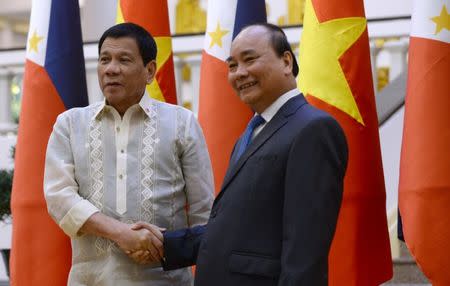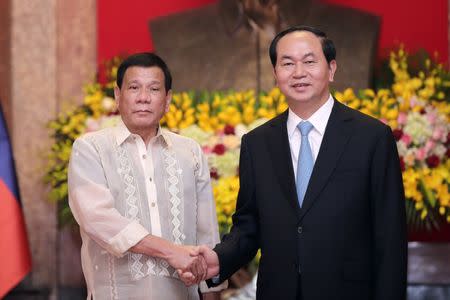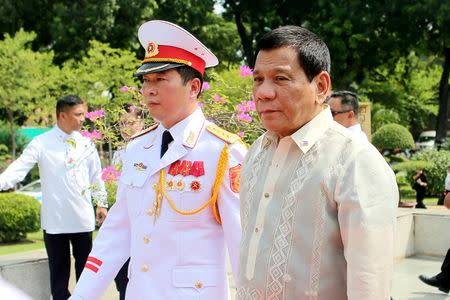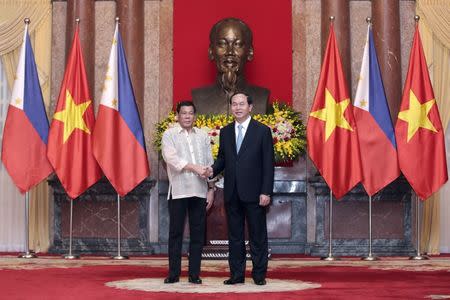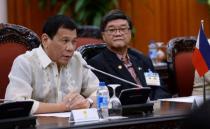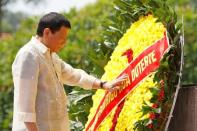As Philippines' Duterte visits Vietnam, U.S. jibes hang over new partnership
By Martin Petty HANOI (Reuters) - Philippines President Rodrigo Duterte met Vietnam's top leadership on Thursday, aiming to advance a burgeoning alliance that could become increasingly uncertain amid his defiance of the United States and overtures towards China. Vietnam and the Philippines have drawn closer as China asserts more vigorously its claims of sovereignty in the South China Sea, but Duterte's almost daily jibes against the United States and his positive rhetoric about China may not sit well with Vietnam's leaders and their quieter, more calibrated diplomacy. Duterte was greeted by an honour guard before he met his counterpart, Tran Dai Quang, for talks. He was also due to meet Prime Minister Nguyen Xuan Phuc and pay Communist Party Chief Nguyen Phu Trong a courtesy call. Vietnam has a joint leadership and no paramount ruler. Hanging over the meetings will be the stir caused by the maverick former Philippine mayor at a function for Filipinos in Hanoi on Wednesday, when he "served notice" to the United States by announcing a cessation of joint military exercises, and ruled out joint navy patrols. Philippine foreign minister Perfecto Yasay said on Thursday the Philippines would go ahead with the joint exercises with the United States in 2017, but the drills would be reviewed from 2018. He said the Philippines did not want a military ally and wished to be friends with all countries, and alienate none, and that would be how it would settle disputes in the South China Sea. While there are questions over U.S.-Philippine ties, thrown into question by Duterte's angry rejection of U.S. concern about his bloody war on drugs, Vietnam's relations with the United States have quickly expanded owing to some U.S. opportunism in the wake of a bitter row in 2014 between Vietnam and China over the South China Sea. U.S. President Barack Obama visited Vietnam in May and announced the removal of a lethal arms embargo, the last major vestige of the war between them a half century ago, allowing for closer defence links and some joint military exercises. Duterte's volatility has added to uncertainty about his foreign policy trajectory and experts anticipate that could weigh on a strategic partnership between Vietnam and the Philippines agreed last year by his predecessor, Benigno Aquino. "Vietnam was quite enthusiastic about its new-found friend in the Philippines under Aquino, but Duterte's constant emotional outbursts against Washington has them a bit concerned," said Murray Hiebert, a Southeast Asia specialist at Washington's Center for Strategic and International Studies. He said Duterte might consult Vietnam's leaders about how they manage relations with China, the United States, and Japan in what was now "a very complicated environment". Vietnam may be also be concerned about how Duterte approaches ties with China and whether that could jeopardise regional efforts to forge a unified position on its maritime activities. "Vietnam would not want Mr Duterte to strike a deal with China over the South China Sea at the expense of Vietnam and other involved states," said political analyst Le Hong Hiep. "The visit can be a timely opportunity for Mr Duterte to explain his South China Sea policy." (Writing by Martin Petty; Editing by Robert Birsel)

 Yahoo News
Yahoo News 